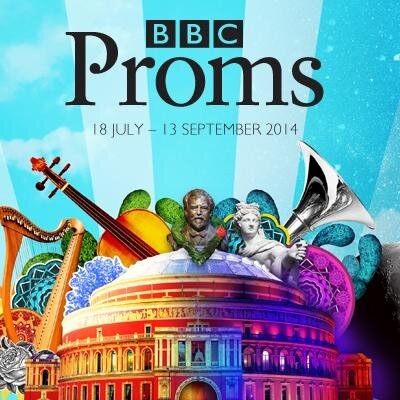Michael Coveney: Power play at the Proms, festival fever in Edinburgh and Enniskillen, disaster in Eastbourne
Looking at the BBC Proms, and further afield to the various festivals on offer in August

Last night’s Prom in the Royal Albert Hall was a humdinger, with performances of Harrison Birtwistle’s melancholic "Night’s Black Bird", Ravel’s remarkable piano concerto for left hand only and Mahler’s mighty fifth symphony, a work whose adagietto is indelibly associated with Dirk Bogarde’s hair dye running down his face on the beach in Luchino Visconti’s film of Death in Venice.
Bogarde buckled Mahler to the cause of forbidden longing as he ogled a blond teenager in a striped swimsuit, much as Mozart’s 21st piano concerto was high-jacked by a Danish tightrope walker in Bo Widerberg’s Elvira Madigan, and "The Blue Danube Waltz", and Richard Strauss’s "Thus Spake Zarathustra", by the mysteries of the galaxy in Stanley Kubrick’s still astonishing 2001: A Space Odyssey.
The Ravel was played by French pianist Alexandre Tharaud – with the BBC Philharmonic conducted by Spanish maestro Juanjo Mena – and he joined the Proms acting director Edward Blakeman’s party in the interval to explain that he keeps having to restrain his right hand from joining in the Ravel, but has no such problem with the encore he gave us, a beautiful left-handed nocturne Scriabin composed when he’d injured his right hand (the Ravel was composed for the war-wounded pianist brother of the philosopher Ludwig Wittgenstein).
Our loggia box also included a former BBC Radio presenter, Sue Sharp; a member of the Guildford Choral Society, celebrating their 175th anniversary this year; the new director of the French Institute, François Croquette (une croquette, monsieur?); and Belinda Matthews, wife of the composer Colin Matthews, and an editorial director at Faber and Faber who are newly in receipt, she tells me, of David Hare‘s autobiography. Very few punches are pulled, as you might expect. Can’t wait to see what Sir David says about the RSC, British musicals, the Arts Council… well, everyone really, and especially the birth of the British fringe.
Edinburgh makes more music
My yearly Proms visit – and the constant background hum on the radio at home; I’ve particularly loved Bach’s "St John Passion" and the too little known "Duruflé Requiem" so far this year – puts me in the mood for the Edinburgh International Festival, which kicks off on Friday week with a mouth-watering opening concert of Schoenberg, Scriabin and Debussy conducted by Oliver Knussen.
Of course I shall be scouring the fringe and writing reviews, alongside the entire WOS team, of anything of note – and some things of no note at all – in Pleasance, Gilded Balloon, Summerhall (my favourite new venue) and the Traverse.
But I shall also be seeing the great central EIF production of Rona Munro‘s The James Plays, Arlene Phillips‘s new dance show, Peter Eyre in Thomas Bernhard’s monodrama Minetti – written for an old actor of that name whom I actually saw in his last ever Berliner Ensemble performance in Arturo Ui, playing an old actor – and Neil Bartlett’s no doubt idiosyncratic take on Benjamin Britten’s Owen Wingrave in an EIF co-production with the Aldburgh Festival.
More Happy Days in Enniskillen
As the Edinburgh fringe explodes into action all over the city today, there’s a quieter alternative in Enniskillen, Northern Ireland, where artistic director Seán Doran’s third Happy Days International Beckett Festival gets underway with about fifteen productions of Waiting for Godot, a Shubertiade (Shubert was Beckett’s favourite composer, as he is mine), a sound installation described as "an Irish Circus on Finnegan’s Wake" in some remote caves on the coast, and a talk by Terry Eagleton trying to reclaim Beckett as a serious political writer rather than a poetic nihilist.
I went to the first Happy Days, an absolute joy, and it’s very good news that the event now runs to ten days and that locally born actor Adrian Dunbar is the artistic associate. Dunbar is directing Beckett’s Catastrophe at a "secret" location, and other literary notables in attendance include Germaine Greer, Carlo Gébler, Blake Morrison and evergreen Beckett specialist and biographer James Knowlson.
Eastbourne Pier goes up in flames
Yesterday afternoon’s fire on Eastbourne Pier – apparently caused by an electrical fault inside wood panelling in the main atrium – is not a tragedy in the context of events in the Middle East, but it is a disaster comparable to that of the collapsed ceiling at the Apollo, though no-one has been injured.
It is one of our finest Victorian piers and had its first theatre constructed for a cost of £250 in 1888. A larger complex replaced this ten years later, and the theatre – famous for its summer shows and variety acts – is now a popular nightclub.
That doesn’t lessen the loss in a seaside town renowned for its summer theatre. There are no less than four venues still going fairly strong: the Congress, where the indefatigable Ken Dodd drops anchor on 10 August; the delightful Devonshire Park where Judy Buxton is in Simon Williams’s murder thriller Double Death; the Hippodrome, where the Barron Knights on tour top the bill this Saturday; and the vasty Winter Garden, which alone appears to be struggling with a pallid programme of tea dances and random comedy shows.
Let’s hope the pier is soon restored – it will cost millions to do so –and doesn’t suffer the scandalous fate of the West Pier in Brighton, still a derelict, mangled mass of metal over ten years on from two major fires.












